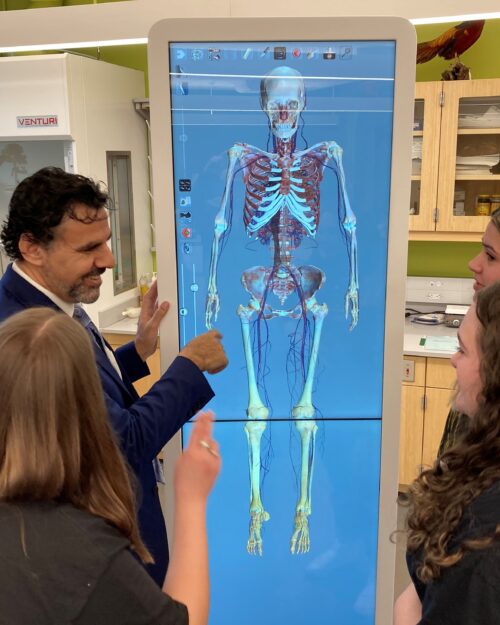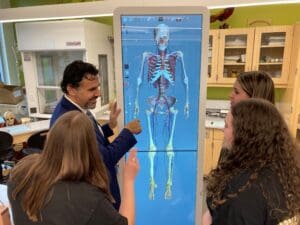PNW Pridecast: Anatomage tables benefit instruction and research

Listen to the Episode
Episode Script
 Greetings, Purdue Northwest colleagues. The PNW Pridecast is back to share more faculty and staff news with you all.
Greetings, Purdue Northwest colleagues. The PNW Pridecast is back to share more faculty and staff news with you all.
I’m Kale Wilk, Communications Specialist in Marketing and Communications, and I’m ready to dive right in!
PNW welcomes Science Olympiad competitors
PNW on Feb. 11 hosted its annual Science Olympiad regional, welcoming 37 middle and high school teams from Northwest Indiana, as well as the South Bend and Lafayette areas. The university has hosted a regional competition for more than 20 years.
The top seven middle and six high school teams qualified from the regional, and they’ll be returning to campus as PNW hosts the Science Olympiad state finals for the first time ever on March 11. The university will welcome 48 teams from across the state for up to 25 different STEM academic competitions, ranging from forensics problem-solving to bridge structure and durability. A single middle and high school winner from the state finals will qualify for the national competition in Wichita, KS.
As a longtime host for Science Olympiad competitions, the events give students a chance to experience PNW’s facilities and state-of-the-art spaces. Not only that, it provides these young learners a preview of where their STEM interests can take them, the types of environments where they could potentially do research, and the scholars they could learn from.
Vanessa Quinn, associate dean in the College of Engineering and Sciences and professor Biology, has served as PNW’s regional tournament director for seven years, and is looking forward to the significant responsibility of hosting academic competitors from around the state.
“I remember when the student competitors come to campus, especially the middle school kids, I have heard them say ‘this is the greatest day of my life and I get to be in college,’” said Quinn. “The competitors get to see that when you go to college you can continue doing these great events or lab projects because we have the facilities they compete in. They also see that college professors are not scary — they are really available and excited to have them here.
“I know some high school students are worried they are going to come to college, get lectured to for eight hours a day, and just have all kinds of homework and that nobody will care about them. Our (college) students are good at communicating that that is not the case. We have students who really understand that the college experience is fundamentally different than the high school experience. Of course, there will always be lectures, but I see them talk with the high school students and show them the stuff you are doing in a club is the stuff you get to do in a college class.”
To learn more information about Science Olympiad or register to volunteer, you can visit pnw.edu/science-olympiad.
IPHS Center researchers engaged in multidisciplinary scholarship
Can routine meditation or mindfulness lower blood pressure? Can two cups a day of herbal tea help improve long-term cardiovascular health? These are just some of the many questions PNW faculty members in the Integrative Physiology and Health Science (IPHS) Center are researching through multidisciplinary and collaborative approaches.
The IPHS Center opened its space in the lower level of the Gyte Building on the Hammond campus during the fall semester, and the research team has grown to include eight members representing the College of Engineering and Sciences, the College of Business, and the College of Nursing.
A range of technology pieces in the lab can measure blood pressure, heart rate, sympathetic nerve activity, and other variables to study the intricate intersections where body composition, activity, exercise, sleep, and much, much more can impact overall health.
The center is also invested in community outreach and impact. During the fall the center was awarded $133,000 from the Indiana Department of Health for its Health Issues and Challenges program. The research team has used the grant to conduct seminars in Lake and LaPorte counties and offer free education and screenings for populations that are deemed socially vulnerable based on the Center for Disease Control and Prevention’s (CDC) social vulnerability index. The seminars in particular are aimed at improving cardiovascular health by using Life’s Simple 7 guidance from the American Heart Association.
Here’s John Durocher, Nils K. Nelson associate professor of Integrative Human Health, with more.
said Durocher. “We’ve had pretty strong participation. We said we would directly impact at least 60 individuals in the area and we’ve made it well over halfway to that goal. As a part of the study, we’ve had the ability through the Indiana Department of Health to give away free automated blood pressure cuffs, pedometers, resistance band training kits, and portable blood glucose monitors. Those are nice giveaways that people can use at home.”
To learn more information about the IPHS Center’s research and the faculty members leading the way, visit pnw.edu/iphs.
Anatomage Table technology benefits Anatomy, Physiology, and Nursing classes
Students in Anatomy, Physiology, and Nursing courses are training with a more in-depth and interactive view of the human body thanks to two new high-tech Anatomage tables being steered by faculty members in the department of Biological Sciences and the College of Nursing.
The tables function as interactive 3D visualizations of the human anatomy that demonstrate the interconnectedness of various bodily functions, but can also essentially serve as a virtual cadaver to benefit pathophysiology lessons.
In fact, the tables come preprogrammed with several cadavers whose families donated their stories to be used with the tables. The tables allow users to go layer by layer with the body to essentially virtually dissect it and determine the factors that contributed to a person’s ailments.
Here’s Julia Rogers, assistant professor of Nursing, with more:
“I love this,” said Rogers. “For (my) undergrad we had cadavers, but for my master’s program we did not have cadavers, so we did a lot of things in the lab. We went to clinicals and saw real patients, but the problem is, in your head, you are just looking at 2D images in your book that say ‘this is what the inside of the body looks like when this disease is happening, now you have to figure out how all of that connects.’
“But now the tables actually give them (the students) that viewpoint from the inside. So I think they are going to be much better at not only assessing but being able to put a path in place — this is their (the patient’s) complaint, so this is where this is, so I need to be looking at this, this, and this as well.
“I always use Diabetes as an example because it affects so many body parts. With Diabetes, people can have numbness and tingling in their feet, and that’s because of what happened to the vessels. So when you are looking at that whole body that is opened up on those tables, you can see why Diabetes would be affecting the vessels from one place to the other and why that numbness and tingling is happening all the way down at their feet.”
Recent news
We have a few items we’d like to close out with:
- Be sure to mark your calendars for March 3 to celebrate Founders Day! The seventh annual celebration is slated from 2 p.m. to 4 p.m. in Alumni Hall on the Hammond campus.
All PNW faculty and staff should have received emails from the Office of the Chancellor with registration information, as well as additional instructions on how to enter into the fight song video campaign.
For more information, you can visit pnw.edu/founders-day.
- PNW was recently recognized as a Fulbright Top Producing Institution for U.S. Scholars by the U.S. Department of State’s Bureau of Educational and Cultural Affairs for its number of applicants selected for the 2022-23 Fulbright U.S. Scholar Program. PNW ranked among other Master’s institutions, as designated by the Carnegie Classification of Institutions of Higher Education.
During the 2022-23 period, Maureen Mascha, associate professor of Accounting, is conducting research related to sustainability reporting and textual data analytics through June 2023 at the University of Vaasa in Finland. Meden Isaac-Lam, associate professor of Chemistry, will promote and exchange interdisciplinary chemistry research between May and August 2023 at the National University of Singapore, Tan Tao University in Vietnam and the University of Santo Tomas in the Philippines.
- The Center for Innovation through Visualization and Simulation (CIVS) announced for the third consecutive year it will host a Research Experience for Teachers (RET) program with the support of a National Science Foundation grant.
During a six-week paid summertime program, high school and community college instructors will be able to work with CIVS and Steel Manufacturing Simulation and Visualization Consortium researchers and students. The program’s goal is to enhance local STEM education and interests through the partnership with local educators.
You can learn more information at pnw.edu/civs.
- There’s still time to join in on Black History Month events at PNW. The annual celebration, led by the Cultural Heritage Celebration Committee, recognizes the essential impact of Black history, accomplishments, and culture. This year’s theme focuses on Black joy and mental health.
Throughout the rest of February, you can join cultural and educational events, including but not limited to, a financial literacy event led by PNW alumna Dakita L. Jones; the Nia Bowl featuring Black culture trivia and good eats; and a Toast to Black Excellence party celebrating Black Joy and the contributions of PNW’s Black community. Information on these events and more can be found by visiting pnw.edu/black-history.
That’s all for this time! Catch up on past episodes and submit your internal faculty and staff news by visiting pnw.edu/pridecast.
This is Kale Wilk signing off, and I’ll connect with you again in a few weeks.